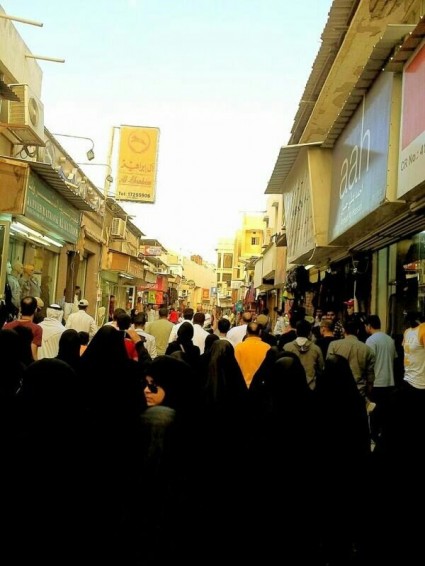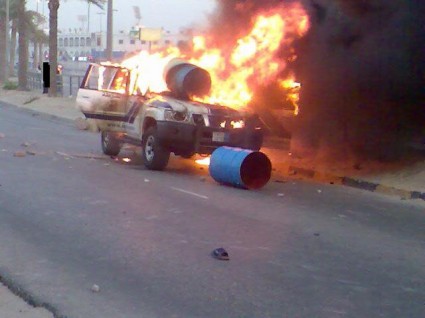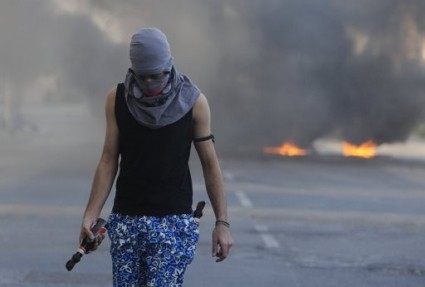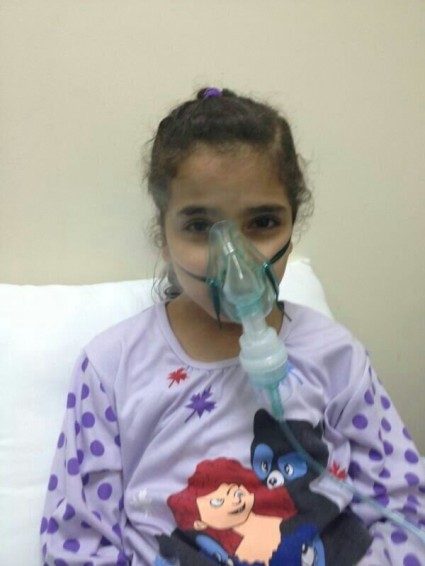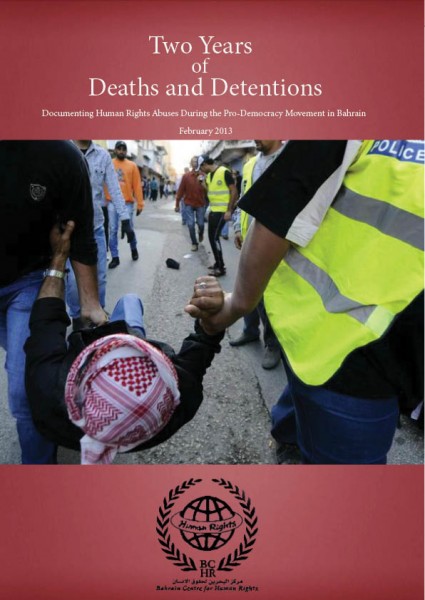Another Day working at the Revolution in Bahrain
February 11, 2013 No Comments
No hope for real change in Bahrain with Al Khalifa at helm
No hope for real change in Bahrain with Al Khalifa at helm: Analyst
11 February, 2013 – Shia Post
A Bahraini opposition leader says that the developments in the past two years in the Persian Gulf island of Bahrain have proved that the ruling Al Khalifa regime cannot be trusted to bring about real changes.
The comments come as Bahraini protesters have held fresh protest rallies marking the second anniversary of their pro-democracy uprising against the ruling regime. Anti-regime demonstrators on Thursday held a massive march in the capital, Manama, while similar rallies were held in several other parts of the country. According to Physicians for Human Rights, many doctors and nurses have been detained, tortured, or have disappeared because they have “evidence of atrocities committed by the authorities, security forces, and riot police” in the crackdown on anti-government protesters.
Press TV has talked with Saeed Shahabi, Bahraini opposition leader from London to further discuss the issue at hand. What follows is an approximate transcription of the interview.
Press TV: Saeed Shahabi we are looking now this going into its second year, is there a chance for reforms to take place or has that threshold been passed at this point, based on what the Bahraini people want?
Shahabi: It is clear from the insistence of the people of Bahrain that they believe that reform was not possible with this regime because it has failed drastically in implementing any sort of reforms.
Two years now of revolution and it has not implemented one single act of real political reforms apart from some technical matters with regards to the politics of the country, how the country is run, what is the role of the people, where does the ruling family stand in the midst of all this.
It has really rejected and refused to look into these matters while the people want real reforms. So the reform is not forthcoming after decades of struggle and the only conclusion from all of this, is that this Al Khalifa dynasty cannot be trusted to rule the country and it is now time for a real change in the country and that Al Khalifa must go and leave the people to look after themselves.
Press TV: If you want to look at, perhaps like the opposition al-Wefaq, what types of activities should they be involved with, regarding pushing forward their agenda for change aside from the protests that we see happening?
Shahabi: I think that there are two blocs in the country.
First you have the revolutionary bloc which consists of the 14th of February Alliance and if course the other movements whose leaders are in jail like Hassan Mushaima, Abdulwahhab Hussain, Sheikh al-Meghdad, Dr. [Abdiljalil] Alsingace, Dr. abdulhadi al-Khawaja; all of these groups are united under the banner of The Alliance for the Republic and then on the other hand you have the political societies which consist of al-Wefaq and others.
Now the people, as you know, because the revolutionary groups are not authorized and they are pursued all the time by the regime, they have limited area for movement, while the political societies have larger areas for movement.
Now the expectation is that these political societies must improve their political performance and that is they should really make themselves clear in their position.
They must call for demonstrations, they must really take the situation further. They can mobilize people, there are many regional scholars who will stand with any move to improve the wellbeing of the people and to ensure that the revolution does not fade away.
I think these political societies need to improve their performance, call for more solidarity with the revolution and also be present in the next week or so on the streets.
They should challenge the regime drastically because without this challenge the regime may feel that it is safe and sound.
I think that you will fall but only if those societies really out their hands in the hands of the revolutionaries. …source
February 11, 2013 No Comments
Bahrain, Kuwait step up brutal crackdowns of dissent while Western Partners step-up weapons sales to Gulf Monarchs
February 11, 2013 No Comments
US State Department policy of isolation toward Bahrain Oppostion turns them to Russia for support
Silent crisis: Bahrain opposition seeks support, international attention in Russia
9 February, 2013 – Russia Times
While Western media are focusing intensely on the Syrian unrest, injustices and human rights violations committed in Bahrain have been left out of sight, its opposition claims.
“The media have been silent about the crisis in Bahrain. There is a political reason to it and is immoral and unprofessional. Those who make a fuss about the events in Syria and Libya have forgotten that the Bahraini people are suffering from political repressions,” Fazil Iskander Abbas, general secretary of National-Democratic movement, said at a press-conference in Moscow.
On Friday, Bahrain opposition leaders met with Russian Foreign Ministry officials in Moscow to seek support in their struggle against the ‘dictatorship’.
Bahrain has experienced a military intervention from Saudi Arabian forces, who were invited to suppress “of its own people and popular movements and peaceful rallies” who demand a real legislative power and a government elected by the people, Fazil Abbas said.
The ‘dictatorship’ is supported by the Arab League, who does not interfere in the situation in the country, and the US, which pursues its own economic and military interests, the opposition leader explained.
Bahrain hosts US crucial naval military base. The opposition believes this is one of the reasons Washington closes eyes to people’s demands for democracy.
“It’s the US administration who blocks the launch of international criminal proceedings over the Bahraini regime. They have used double standards – on the one hand, they demand regime change in Syria, and on the other they support a dictatorship regime in Bahrain,” said Abbas.
The delegation expressed hope that the Bahraini people would accept and welcome Russian support.
“We urge the Russian leadership to support a serious dialogue in Bahrain and, in case this dialogue doesn’t take place, we urge Russia to take up a tough stance in international organizations that would prevent the US from ignoring the Bahraini crisis on the international level,” Abbas said.
Meanwhile, Bahraini authorities claim the country has no problems with freedom of speech or democracy.
“There is a democratic regime with high level of freedoms established in Bahrain,” said Information Minister Samira Rajab Bahraini told RT.
The minister denounced the opposition visit to Moscow, saying that use of international forces to interfere with sovereign issues of the state is not civilized or politically healthy.
Recent months have seen massive anti-government protests in Bahrain where people demand greater democracy and calling for an end to the Al-Khalifa family’s nearly four-decade rule. They accuse the ruling Sunni family of a crackdown on the country`s Shiite majority.
Some of the peaceful rallies turned violent as police tried to disperse demonstrations using teargas and grenades. In January one protester died after inhaling poisonous teargas. …source
February 11, 2013 No Comments
Bahrain Regime Mercenaries leave 8 year old Haifa Isa fighting for life in another Gas attack on Children
February 11, 2013 No Comments
Bahrain Regime’s Military Agreements with West an Impediment to Progress on Democracy and Human Rights
Bahraini Activist Discloses Al-Khalifa Regime’s Military Agreements with West
30 January, 2013 – FARS
TEHRAN (FNA)- A Bahraini activist lashed out at the al-Khalifa regime for its crackdown on the people, and disclosed that the Bahraini rulers have secretly signed military and security agreements with the West, specially the US and the UK, over the suppression of those civilians who take part in the country’s peaceful demonstrations.
“In addition to their arms sales to the regime, both Britain and America help the al-Khalifa regime with the suppression of the people’s revolution through their recommendations,” a leader of Bahrain’s al-Ahrar Movement Jafar al-Hessabi told FNA on Wednesday.
He noted that after the outbreak of the revolution in Bahrain, several experts of the UK’s Scotland Yard have been in Manama to advise the al-Khalifa regime on how to crack down on the people.
“Bahrain has military agreements with Britain and this country exports weapons to Bahrain, and the Bahraini crown prince was recently in the UK to sign new agreements (with that country),” al-Hessabi said.
In Bahrain, protesters and police clash almost daily as Demonstrations are banned.
Anti-government protesters have been holding peaceful demonstrations across Bahrain since mid-February 2011, calling for an end to the al-Khalifa dynasty’s over-40-year rule, end of discrimination, establishment of justice and a democratically-elected government as well as freedom of detained protesters.
Violence against the defenseless people escalated after a Saudi-led conglomerate of police, security and military forces from the Persian Gulf Cooperation Council (PGCC) member states – Saudi Arabia, Kuwait, the United Arab Emirates, Oman and Qatar – were dispatched to the tiny Persian Gulf kingdom on March 13, 2011, to help Manama crack down on peaceful protestors.
So far, tens of people have been killed, hundreds have gone missing and thousands of others have been injured. …source
February 11, 2013 No Comments
Two Years on, Democracy and Human Rights Remain Crushed Underfoot of Western Imperialism
February 11, 2013 No Comments
Bahrain Political Prisoners on Day 30 of Hunger Strike Protesting Unjust Detention, Torture and Abusive Prison Conditions
Bahrain: Urgent Appeal: Al-Khawaja, Al-Mukhoder, and Al-Singace on Hunger Strike
7 February, 2013 – Bahrain Center for Human Rights
The Bahrain Center for Human Rights is gravely concerned for the health of three activists and political leaders, Abdulhadi Al-Khawaja, AbdulHadi Al-Mukhoder and AbdulJalil Al-Singace, who have all begun a hunger strike to protest the unlawful restrictions that the prison authorities have placed on the communications for the Bahrain13, and the lack of response to their complaints by the prison administration.
When speaking on the telephone, if any of these prisoners attempts to discuss their health, their treatment in prison, or politics, the phone line is immediately cut. Since the prisoners of conscience had their final appeal denied in January, the restrictions have become much worse.
In addition to the unlawful restrictions that the authorities have placed on family communications, Al-Mukhoder and Al-Singace have both been completely denied access to a lawyer since their final appeal was rejected by the Court of Cassation on January 7th, 2013; Al-Khawaja is still allowed contact with his lawyer as he has a separate ongoing trial. BCHR has documented similar treatment to other activists, most recently on Dec 2012 bahrainrights.hopto.org/en/node/5584.
More than 25 days ago the above mentioned activists and political leaders, as well as the rest of the group of the Bahrain13, who are held on the case of “attempt to overthrow the regime” (More details: bahrainrights.hopto.org/en/node/5272 ) have all sent a letter to the prison administration to express protest to the violations to their right to concurrent and private communication with their family and lawyers. The incident which triggered this protest was when Hassan Mushaima attempted to tell his family about his health situation and the phone line was cut. They have boycotted their right to regular calls with their families as a protest. However no reply has been received from the prison administration to their letter and no improvement was seen on conditions. Thus the three activists have decided to escalate their protest and start a hunger strike to demand their basic rights.
Al-Khawaja began his strike on the 2nd of February, Al-Mukhoder and Al-Singace on the 5th and 7th respectively. Alkhawaja has been previously through a 110 days hunger strike which started in Feb 2012.
Lawyer Mohamed AlJishi has reported that AbdulJalil Alsingace has been taken to clinic to be treated three times since the start of the hunger strike.
The BCHR is seriously concerned that the authorities attempt to block all information relating to the detainees’ health and treatment is an attempt to hide human rights abuses. However, the primary concern of the BCHR remains to be that these men are prisoners of conscience, imprisoned on charges related to freedom of expression, and must be released immediately.
The Bahrain Center for Human Rights call for immediate action on behalf of the Bahraini authorities and the international community to:
• release all political prisoners and prisoners of conscience from prison immediately.
• implement sweeping reforms through the prison system to improve transparency and improve general prison conditions, including the recommendations in the BICI report.
• abide by the BICI report’s recommendations to investigate torture allegations throughout the judicial system and prosecute those found to be responsible in a fair and transparent court of law.
February 11, 2013 No Comments
Two Years of Deaths and Detentions – A Report from Bahrain Center for Human Rights
The Bahrain Center for Human Rights publishes a second anniversary report:
Two Years of Deaths and Detentions
Documenting Human Rights Violations During the Pro-Democracy Movement in Bahrain
FOR IMMEDIATE RELEASE
(Copenhagen) – The Bahrain Center for Human Rights (BCHR) publishes their Second Anniversary Report Two Years of Deaths and Detentions, Documenting Human Right Abuses During the Pro-Democracy Movement in Bahrain. It is a quarterly edition of the continuing documentation of human rights violations in Bahrain following the start of the pro-democracy movement on February 14th, 2011.
This report aims to document the nature of King Hamid bin Al-Khalifa’s reaction to the pro-democracy movement in Bahrain.
February 11, 2013 No Comments

